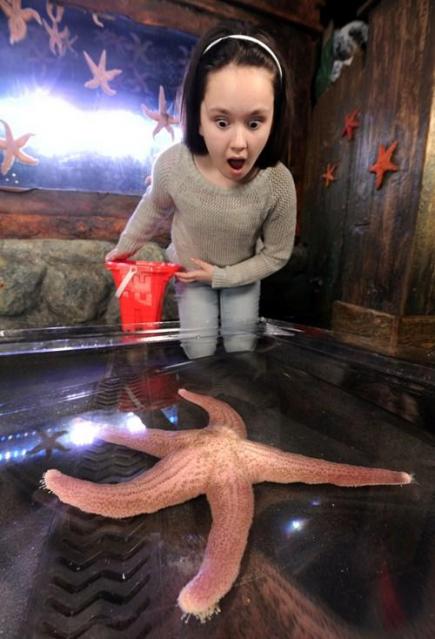Nickelodeon’s SpongeBob SquarePants has tickled audiences young and old for years ever since it first hit screens back in 1999.
Spongebob, along with starfish best mate Patrick, put life under the sea in the public gaze in animated form.
But now Patrick has some competition as Manchester gets set to welcome a dazzling array of starfish from across the world’s oceans.
Sea Life Manchester is throwing open its tanks later this month to seven species of the echinoderm including the Red Knobbed starfish, the Giant Pink starfish and the Pincushion starfish.
These gender-bending creatures, who can undergo an organic male to female sex change, not only eject their own stomachs to eat their dinner but also emit a pretty bioluminescence which some describe as ‘underwater chandeliers’.

WHAT A WHOPPER! One small visitor eyes up a starfish
Visitors to the Sea Stars exhibition, which opens on March 14, will get the chance to get up-close and personal with the seemingly humble creatures and relive childhood memories of holidays by the coast.
“Sea stars are amazingly complex animals which play a crucial role in maintaining the health of our seas,” said Lucy Handel, Displays Curator at Sea Life Manchester.
“Like most species, the more you learn about them, the more fascinating they become, and we aim to provide an insight into their incredible biology that would astonish anybody.”
There are around 1,500 species spread across all oceans from tropical to polar waters, and from shallow tidal pools to depths of 20,000 feet.
Starfish have no brain but do possess a complex nervous system and are sensitive to light, touch and water chemistry.

FASCINATING: School children get the chance to take out the visitors
“For defence they employ bitter-tasting chemicals and in some cases powerful toxins, and as a last resort most can shed an arm to escape, growing a replacement later,” said Lucy.
“But perhaps the most important thing about starfish is that they are a ‘keystone’ species, meaning they can indicate how healthy a marine environment is or not.
“A good population of starfish usually ensures a good biodiversity, whereas if they’re removed for any reason the creatures they prey on – like mussels – can quickly overwhelm a habitat and make it inhospitable for most other species.”
For more information about Sea Life Manchester visit www.visitsealife.com/manchester or call 0871 221 2483.



